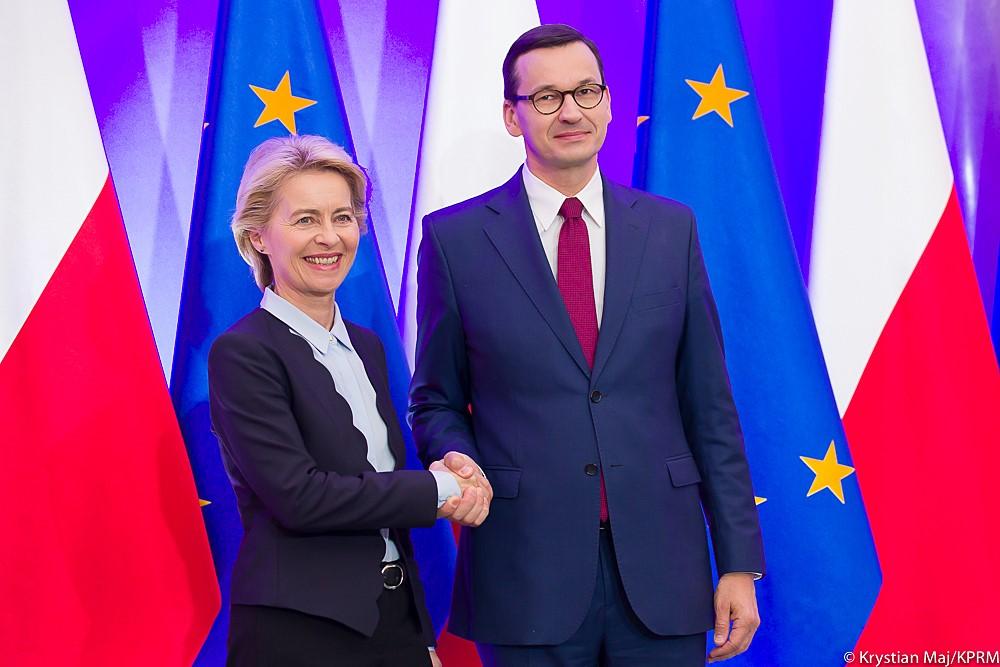Poland’s first payments from the EU’s post-pandemic recovery funds, totalling over €5 billion, are set to be approved next month, a government minister has confirmed. Brussels has so far been blocking Poland’s money due to concerns over the rule of law, but the planned payments come from a newly added part of the funds.
The announcement comes as a new coalition of opposition parties – who have promised to restore the rule of law and improve relations with the EU – prepares to come to power following their success at last month’s elections.
However, Grzegorz Puda, the current minister for funds and regional policy, says that the release of funds is thanks to the “very effective work” of the current government.
Donald Tusk, who is likely to lead Poland’s next government, met today with @EU_Commission President @vonderleyen in Brussels.
Afterwards, he said that concrete steps to restore the rule of law must be taken before the EU releases Poland's frozen funds https://t.co/Vhl56kZL3x
— Notes from Poland 🇵🇱 (@notesfrompoland) October 25, 2023
Bloomberg first reported yesterday morning, based on an unnamed source familiar with the matter, that the European Commission would sign off on the release of funds for Poland in the coming weeks.
The money would come from the RePowerEU programme, which is designed to help member states end reliance on Russian fossil fuels. It was added to the EU’s larger post-pandemic recovery fund – known as the Recovery and Resilience Facility (RFF) – last year in the wake of the invasion of Ukraine.
The Polish government requested access to RePowerEU funds in August, reports Bloomberg, whose source says that $550 million in “pre-financing not subject to conditions” could be released by mid-December. However, further access to the funds would require meeting conditions, including regarding the rule of law, they added.
❗️NEW: EU Commission is nearing approval of around €550m of EU funds for Poland to reduce energy dependence from Russia (Repower pre-financing), we are told. Decision with no conditionality to be confirmed by Ecofin in early Dec.
-with @Natalia_Ojewska https://t.co/uVgCYTr2ul
— Jorge Valero (@europressos) November 15, 2023
Speaking to the Polish Press Agency (PAP) after Bloomberg’s report, Puda confirmed that “Poland will receive advance payments from the Recovery and Resilience Facility as part of the revised national plan regarding RePowerEU”.
“It will be over €5 billion”, paid in two tranches next year, and is not subject to Poland meeting any of the “milestones” agreed with the European Commission, added the minister, who said the plans should receive final approval by the EU on 8 December.
“The payment of funds is the result of many months of work and very effective actions of officials at the ministry of funds and regional policy,” said Puda, who noted that he had submitted the application for the funds in March this year.
It is not the result of “any miracles from Tusk”, he added in a tweet, referring to opposition leader and likely incoming prime minister Donald Tusk, who visited Brussels last month to discuss unlocking EU funds.
Polska otrzyma zaliczki w ramach rewizji #KPO o #REPowerEU. To efekt złożenia przeze mnie, jako ministra ds. funduszy, odpowiedniego wniosku i skutecznych, wielomiesięcznych działań urzędników #MFiPR, a nie żadne cuda Tuska! Zaliczki nie są uwarunkowane tzw. kamieniami milowymi.
— Grzegorz Puda (@GrzegorzPuda) November 15, 2023
Brussels has been blocking around €35 billion in post-pandemic recovery funds for Poland over rule-of-law concerns, in particular relating to the independence of the judiciary. RePowerEU, which was created last year, will bring the total amount available to Poland up to €60 billion, notes Bloomberg.
In 2021, Warsaw agreed a series of “milestones” with Brussels in order to unlock the funds. However, despite Poland rolling back some of its judicial reforms, the European Commission said earlier this year that “serious concerns” remain over the rule of law.
Poland’s national-conservative ruling party, Law and Justice (PiS), however, argues that Brussels has been withholding the money for political reasons in the hope that it would help the opposition, led by Tusk, come to power.
PiS lost its parliamentary majority at last month’s elections and, although President Andrzej Duda has given it the first shot at forming a new government, those efforts are likely to fail, paving the way for Tusk and the opposition coalition he leads to take power, probably in mid-December.
Poland's new parliament met today for the first time, with the three opposition groups that now hold a majority voting in their candidate as speaker
But the president this evening entrusted the ruling PiS party with forming a government
Read our report⬇️ https://t.co/giXeZJhUSP
— Notes from Poland 🇵🇱 (@notesfrompoland) November 13, 2023

Notes from Poland is run by a small editorial team and published by an independent, non-profit foundation that is funded through donations from our readers. We cannot do what we do without your support.
Main image credit: Krystian Maj/KPRM (under CC BY-NC-ND 3.0 PL)

Daniel Tilles is editor-in-chief of Notes from Poland. He has written on Polish affairs for a wide range of publications, including Foreign Policy, POLITICO Europe, EUobserver and Dziennik Gazeta Prawna.



















